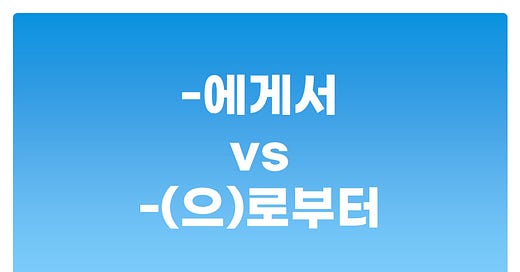Let's study about the differences between "-에게서" and "-(으)로부터" today.
Both "-에게서" and "-(으)로부터" are used to express the source or origin of something, but there are differences in their usage depending on context and formality.
1. "-에게서" (from someone)
Definition: "-에게서" is used to indicate that someone received something from a person or that an action was done by someone toward the speaker or subject. It is mainly used when referring to people or animals.
Usage:
It is primarily used with people or living beings (not objects or places) to express that something originates from them.
It’s similar to saying "from" someone in English.
Examples:
"친구에게서 선물을 받았어요."
(I received a gift from my friend.)"형에게서 배웠어요."
(I learned it from my older brother.)"강아지에게서 좋은 냄새가 나요.
(There’s a good smell coming from the dog.)
2. "-(으)로부터" (from someone or something)
Definition: "-(으)로부터" can also be used to indicate that something comes from a source, but it is more formal and can be used with both people and non-living things (like places, organizations, or concepts).
Usage:
"-로부터" is used when the noun ends in a vowel, and "-으로부터" is used when the noun ends in a consonant.
It can be used for people or non-living sources (like organizations, abstract ideas, or places), making it more versatile.
It tends to sound more formal compared to "에게서."
Examples:
"정부로부터 도움을 받았어요."
(I received help from the government.)"학교로부터 상을 받았어요."
(I received an award from the school.)"친구로부터 편지를 받았어요."
(I received a letter from my friend.)Here, "-(으)로부터" is more formal than "-에게서" but can still be used with people.
Key Differences:
"-에게서":
Used primarily with people or animals.
More commonly used in informal conversations.
"-(으)로부터":
Can be used with both people and non-living entities (such as organizations or places).
More formal in tone and used in official or written contexts.
Summary:
Use "-에게서" when talking about receiving something from a person or an animal in everyday conversation.
Example: "친구에게서 돈을 받았어요." (I received money from my friend.)
Use "-(으)로부터" when you want to express the source more formally, or when talking about non-living entities like organizations.
Example: "회사로부터 보너스를 받았어요." (I received a bonus from the company.)
This distinction helps you choose the right particle depending on the context and level of formality!



